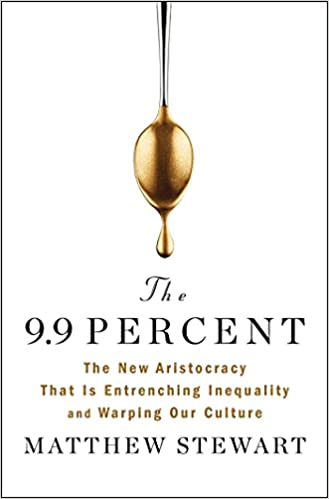You have /5 articles left.
Sign up for a free account or log in.
 The 9.9 Percent: The New Aristocracy That Is Entrenching Inequality and Warping Our Culture by Matthew Stewart
The 9.9 Percent: The New Aristocracy That Is Entrenching Inequality and Warping Our Culture by Matthew Stewart
Published in October 2021
Matthew Stewart, who holds a doctorate in philosophy from Oxford University, makes three big arguments in The 9.9 Percent.
First, Stewart situates America’s extreme and expanding levels of income and wealth inequality as the fundamental determinant of political polarization and extremism, the health and health-care crisis, and our looming climate change-driven environmental catastrophe.
Second, Stewart blames our increasingly stratified society not on the very wealthy but on the 9.9 percent of professionals that benefit from and maintain the economic status quo.
Third, the proper arenas to combat runaway stratification are politics and policies that benefit workers rather than wealthy investors.
Some definitions: if your total net worth ranges somewhere between $1.2 and $20 million, you are in the top 9.9 percent of the wealth distribution. If your household income is around $200,000 or over, you are in the top 9.9 percent.
The first objection that most readers of The 9.9 Percent will have is to question the decision to lump families together whose combined household income barely gets them into this classification with the truly wealthy. After all, the top 5 percent of the wealthiest households have a net worth of over $2.5 million. The top 1 percent of income earners make $500,000 and up. And the wealthiest 1 percent of individuals enjoy a net worth starting at $4.4 million. Of course, there is an enormous range within that 1 percent. At the rarefied levels of the 0.1 percent, individual net worth starts at $25 million.
Anticipating this objection, Stewart argues that membership in the 9.9 percent is as much a state of mind as paychecks and investment portfolios. If you own your home in a neighborhood with well-regarded public schools, you are probably in the 9.9 percent. If college for your children is a certainty, one not dependent on scholarships but manageable by loans, then you are in the 9.9 percent. If you are not living paycheck to paycheck and have some financial cushion to absorb a job loss, you might also qualify for inclusion in the 9.9 percent.
How are 9.9 percenters responsible for rising inequality if almost all the wealth gains have accumulated at the very top of the distribution?
Stewart argues that it is the 9.9 percent, made up mainly of the professional class in medicine and finance and tech, who administer (and benefit from) our unequal economic system. Well-paid financial advisers and investment professionals mostly manage the portfolios of the very wealthy. Doctors get paid well not for their impact on improving population health but through their enforcement (through professional associations) of an artificially low supply of physicians. Technology professionals primarily work on technologies that extract money (through attention or purchasing) from the bottom 90 percent and redistribute those dollars to wealthy shareholders and a few executives.
How is higher education implicated in the tyranny of the 9.9 percent? Stewart is critical of university endowments that grow tax-free. He points to the ways that nonprofit colleges escape contributing to their local communities by avoiding paying property taxes. At the most selective and renowned universities, wealthy students make up a disproportionate percentage of the student body
Will reading The 9.9 Percent convince anyone to change their mind on how one thinks about inequality or what policies to support or oppose? Doubtful. Although it is not clear that any of us ever change our minds about big things due to what we read, see or hear. If you are inclined to believe that growing levels of income and wealth stratification are central problems of our time, then you are a likely reader for The 9.9 Percent. Most readers of The 9.9 Percent will come from this income/wealth category.
Being blamed for the problem (rising inequality) makes for an engaging reading experience. One wants to keep arguing for reasons not to be convicted of the charge, and Stewart keeps coming up with convincing arguments for his readers’ guilt. Conservative readers of The 9.9 Percent, if such a reader might exist, will likely not be troubled by their culpability in perpetuating inequality.
How responsible is our postsecondary ecosystem for rising levels of inequality?
To what degree do the rising cost of higher education and the growth of student debt contribute to the story of growing economic stratification?
Have economic theories that originated and refined within academia given the wealthy the intellectual cover to justify their extreme wealth?
If you are in the 9.9 percent, how does your work directly contribute to or ameliorate levels of inequality in our society?
What are you reading?








